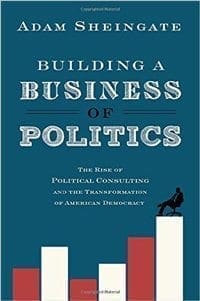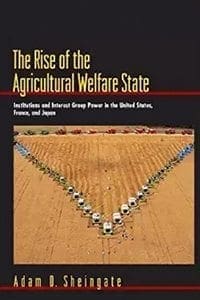
Adam Sheingate
Professor
Contact Information
- adam.sheingate@jhu.edu
- Curriculum Vitae
- 335 Mergenthaler
- SP25: Th 1:30pm - 3:30pm / By Appt
- 410-516-7540
Research Interests: American political development, historical institutionalism, comparative public policy
Education: PhD, Yale University
Adam Sheingate is a professor of Political Science at Johns Hopkins University where he teaches courses on American politics and institutions, including a popular seminar on the politics of food. His most recent book is Building a Business of Politics: The Rise of Political Consulting and the Transformation of American Democracy.
He is also a co-editor of the Oxford Handbook of Historical Institutionalism and the author of the Rise of the Agricultural Welfare State: Institutions and Interest Group Power in the United States, France, and Japan as well as journal articles and book chapters on American political development, historical institutionalism, and comparative public policy. Sheingate is also co-editor of Governance: An International Journal of Policy, Administration, and Institutions. Sheingate joined the Johns Hopkins University faculty in 2000 and served as Department Chair from 2015-2020.
Undergraduate Courses
The Politics of Food: Surveys the variety of policy issues associated with food and agriculture. Topics include the politics of agricultural subsidies, conflicts over genetically-modified foods, rising concerns over food safety, and debates over the health effects of obesity.
Introduction to Social Policy and Inequality: Baltimore and Beyond: Introduces students to basic concepts in Economics, Political Science, and Sociology relevant to the study of social problems and the programs designed to remedy them. Co-taught with faculty from Economics and Sociology
The American Presidency: Traces the historical development of the presidency, the operation of the presidency in contemporary American politics, and the components of presidential leadership.
Graduate Courses
American Political Development: A historically-oriented approach to the study of American politics that examines the evolving character of the American state, changing conceptions of national citizenship, and a critical assessment of timing and temporality in the study of political institutions.
The Development of American Political Institutions: Examines the development of the American party system, the evolution of congressional institutions, rules, and procedures, and the changing relationship between the presidency and the public.
Pragmatism and Politics: An inquiry into Pragmatism and its application to the empirical study of politics using readings drawn from classical and recent texts in philosophy, cultural theory, sociology, economics, science studies, as well as political science.
Historical Institutionalism in Political Science. In The Oxford Handbook of Historical Institutionalism, edited by Orfeo Fioretes, Tulia Falleti, and Adam Sheingate (Oxford University Press, 2016), 3-30. With Orfeo Fioretes and Tulia Falleti.
Agrarian Social Pacts and Poverty Reduction. In Developmental Pathways to Poverty Reduction, edited by Yusuf Bangura (Palgrave-MacMillan, 2015), 149-174.
Institutional Dynamics and American Political Development, Annual Review of Political Science 17:1 (May 2014): 461-477.
Creating Political Strategy, Controlling Political Work: Edward Bernays and the Emergence of the Political Consultant. In Political Creativity: Reconfiguring Institutional Order and Change, edited by Gerald Berk, Dennis Galvan and Victoria Hattam (Penn Press, 2013).
Rethinking Rules: Creativity and Constraint in the House of Representatives. In Explaining Institutional Change: Ambiguity, Agency, and Power, edited by James Mahoney and Kathleen Thelen (Cambridge University Press, 2010), 168-203.
Why Can’t Americans See the State? The Forum 7:4 (January 2010): online, 15 pages. Reprinted as “Pourquoi les Américains ne voient-ils pas l’Etat?” Revue française de science politique 64:2 (2014): 207-219.
Federalism and the Regulation of Agricultural Biotechnology in the United States and European Union. Journal of Comparative Policy Analysis 11:4 (December 2009): 475-795.
Publicity and the Progressive Era Origins of Modern Politics. Critical Review 19:2 (May 2008): 461-480. Reprinted in Rethinking the Rhetorical Presidency, edited by Jeffrey Friedman and Shterna Friedman (Routledge, 2012).
The Terrain of the Political Entrepreneur. In Formative Acts: American Politics in the Making, edited by Stephen Skowronek and Matthew Glassman (Penn Press, 2007), 13-31.
Structure and Opportunity: Committee Jurisdiction and Issue Attention in Congress. American Journal of Political Science 50:4 (October 2006): 844-859.
Promotion versus Precaution: The Evolution of Biotechnology Policy in the United States. British Journal of Political Science 36:2 (April 2006): 243-268.
Occupation Politics: American Interests and the Struggle over Health Insurance in Postwar Japan. Social Science History 30:1 (Spring 2006): 137-164. With Takakazu Yamagishi.
Austerity Politics, the New Public Management, and Administrative Reform in the United States, Britain, and France. In Transatlantic Policymaking in an Age of Austerity, edited by Martin Levin and Martin Shapiro (Georgetown University Press, 2004), 224-252.
Political Entrepreneurship, Institutional Change, and American Political Development. Studies in American Political Development 17:2 (Fall 2003): 185-203.
Agricultural Retrenchment Revisited: Issue Definition and Venue Change in the United States and European Union. Governance 13:3 (July 2000): 335-363.
Digital Advertising in U.S. Federal Elections, 2004-2020. Journal of Quantitative Description: Digital Media 2 (2022). DOI: https://doi.org/10.51685/jqd.2022.026. With James Scharf and Conner Delahanty.
Policy Regime Decay. Policy Studies Journal 50:1 (2022): 65-89.
Populism, Politicization, and Policy Change in US and UK Agro-food Policies. Journal of Comparative Policy Analysis 23:5-6 (2021): 544-560. With Alan Greer.
Practices of Dynamic Order. Perspectives on Politics. 16:2 (2018): 312-327 With Nicolas Jabko. [P]

Building a Business of Politics: The Rise of Political Consulting and the Transformation of American Democracy
author
Oxford University Press ,
2016

The Rise of the Agricultural Welfare State: Institutions and Interest Group Power in the United States, France, and Japan
author
Princeton University Press ,
2003